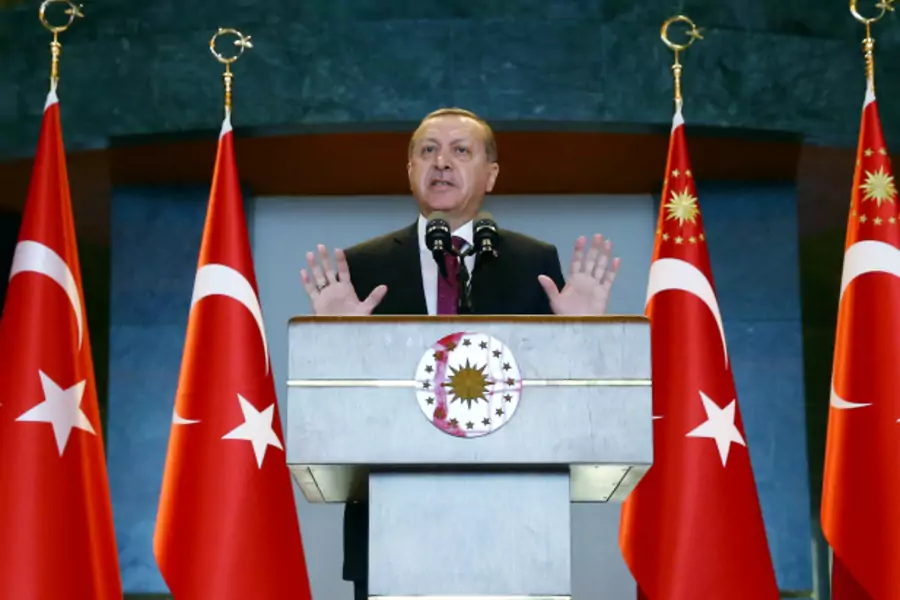Recep Tayyip Erdogan: Turkey’s Executive President

A little more than twelve years ago, Turkey began membership negotiations to join the European Union. At the time it seemed to be the conclusion of a four-decade-long Turkish effort to become part of the West. The government of Turkey—then, as now, under the leadership of the Justice and Development Party (AKP)—had not exactly fulfilled all of the requirements to begin the process, but the European Commission reasoned that the very act of opening negotiations on the acquis communautaire would encourage the Turks to fulfill their obligations. I trace the path from this hopeful moment to Turkey’s current authoritarian reality in my upcoming book, False Dawn: Protest, Democracy, and Violence in the New Middle East. There is neither need nor space to give the whole story away here, but it is important to note that Turkey is about to reach the culmination—or denouement—of this fascinating and, for many Turks, dispiriting tale. Before the week is out, Turkey will become a full-fledged electoral autocracy.
Over the last week the freelance journalist Michael Sercan Daventry has been tracking a series of constitutional amendments the AKP-dominated Grand National Assembly has undertaken on his website, jamesinturkey.com. (Note that there is no actual “James”; it was a pseudonym for Daventry, whose work I highly recommend). Taken together these amendments will fundamentally alter Turkey’s political system, establishing the “executive presidency” that President Recep Tayyip Erdogan covets and, in the process, further undermining whatever remaining checks and balances there are (at least on paper) among the branches of Turkey’s government. The uninitiated might ask, “Isn’t Erdogan already president?” He is, but Turkey features a hybrid presidential-parliamentary system. Contrary to the common claim often made in the press, the Turkish presidency is not largely ceremonial. It has a variety of important powers including, but not limited to, the ability to call parliament into session, promulgate laws, resubmit draft legislation to the Grand National Assembly, call new parliamentary elections, and issue decrees with the force of law. Still, the locus of political power has always been in the prime ministry, and, by both law and tradition, Turkish presidents are supposed to exercise their powers in an “above politics” manner. It has not always worked that way, of course, but neutrality has been the norm that Turkey’s heads of state have claimed to uphold. Until now.
More on:
When Erdogan became president in August 2014, after eleven-and-a-half years as prime minister, he remained the central figure in Turkish politics. He empowered the presidency both formally, by availing himself of prerogatives previous officeholders had chosen not to use, and informally, by dint of the power and prestige he accumulated during his tenure as prime minister. On one level it makes no difference whether the AKP pushes through the amendments successfully or not because Erdogan already wields the power of the executive presidency. On another level, however, it is critical for Erdogan for two related reasons: legitimacy and legality. All politicians and political systems need both, but authoritarian leaders seem particularly eager to situate their nondemocratic practices in the legal institutions of the state. This way, Erdogan—like Egypt’s Abdel Fattah al-Sisi, Zimbabwe’s Robert Mugabe, Hungary’s Viktor Orban, and others—can claim without stretching credulity that whatever he is doing is perfectly legal. Ask a Turkish official why there are so many journalists in jail and they will respond that there is nothing they can do because the detention of journalists is well within the law. Erdogan will no doubt proclaim that the constitutional changes that will direct the vast majority of political power to his office reflects the democratic will of the people. There is a certain amount of “truthiness” to this claim, but according to Daventry and other observers, the AKP has been whipping votes ferociously and employing parliamentary maneuvers to undermine secret balloting, forcing those who might not support the executive presidency to vote for it out of fear. In Turkey’s present political climate this could mean absolutely anything, but wayward members of the ruling party would likely be accused of membership in or otherwise supporting a terrorist organization, as too many Turkish journalists can attest to.
Erdogan and his supporters have tried to sell the executive presidency on the idea that a shift to a purely presidential system is critical to Turkey’s stability. It is true that the country is unstable. Turkey is fighting a dirty little war with the Kurdistan Workers’ Party (PKK) and an offshoot called the Kurdistan Freedom Falcons. Moreover, the self-styled Islamic State is targeting the country, and the Turkish military is engaged in combat in Syria against another PKK affiliate, the People’s Protection Units. Add to these significant security problems the political uncertainty and massive purges after last July’s failed coup as well as an economy that is rapidly deteriorating and you have an array of tremendous challenges, but it is not altogether clear how the constitutional changes will help resolve these pressing problems. Erdogan has also used the memory of the political instability of the 1990s and early 2000s, when a series of coalition governments faltered due to ideological incompatibility, corruption, and infighting, as justification for his expansion of presidential powers. One shudders to think how the Motherland–True Path or the True Path–Welfare or the Democratic Left–Motherland–Nationalist Movement coalitions would have handled Turkey’s current multidimensional crises. This does not mean that Erdogan can return Turkish stability and prosperity, though no doubt he believes he can.
There is one other issue that Turks should consider as their representatives seek to formalize Erdogan’s personal power. Presidential systems tend to slide into authoritarianism more often than parliamentary systems. Then again, Turkey is already there.
More on:
 Online Store
Online Store